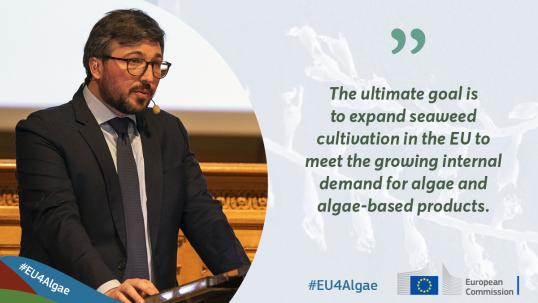If you’re interested in joining EU4Algae and contributing to the Working Groups, click here for more information.
Let’s dive into the Macroalgae Production Working Group: which challenges and opportunities does it address? Adrien Vincent, facilitator of the Working Group tells us more.
What is the primary goal of the Macroalgae Production Working Group?
This working group aims to support seaweed farmers in Europe to grow. The ultimate goal is to expand seaweed cultivation in the EU. Moving to a larger production scale is necessary to meet the growing internal demand for algae and algae-based products. It is crucial to support the algae farmers and make the production process cheaper and more accessible. How can the working group help? By building bridges. For instance, it aims to facilitate knowledge and experience sharing between seaweed farmers and other stakeholders working in the sector. Finally, it also hopes to attract new professionals to enter the industry by providing them with the right tools and role models and to access financing.
Why is it essential to support the scale-up of European seaweed cultivation?
The internal demand for high-quality, traceable, sustainably grown seaweed is expected to increase significantly in the coming years: it may reach up to EUR 9 billion in 2030. To satisfy this request, we must produce millions of tonnes of fresh seaweed yearly, far above current production levels. Today, cultivated European seaweed is insufficient in volume, too expensive and produced by a fragmented supply chain. It is crucial to increase production massively. Doing so will depend on cost-efficient farming scale-up, which must meet sustainability criteria.
In the EU, regulation and licencing criteria are fragmented and change from one member state to another. So far, only a few companies have managed to secure a license for large-scale operations and have access to sufficient funding to expand.
The price of EU-grown seaweed is another critical aspect. Its high quality, traceability, and local sourcing are added benefits that can justify a premium price for European seaweed versus imported Asian products. However, European seaweed will be considered an economically viable raw material source only if the price structure changes. The current price often makes it ten times as costly as imports. We need to cut production costs drastically in Europe. Economies of scale will naturally occur as farms grow bigger, and assets like boats or seeding and harvesting machinery can be amortised.
About the EU4Algae Forum
Algae have been produced and consumed throughout the world for centuries. Especially appreciated in Asian cuisine, they are recently becoming a common ingredient in Western vegan dishes. Outside the culinary realm, algae have become a go-to feedstock for sustainable industrial applications such as biodegradable plastics. Moreover, their production helps improve ocean health by reducing carbon dioxide, phosphorus and nitrogen in marine ecosystems. They are also a nursery and hide-out for many marine animals, stimulating underwater biodiversity.
Despite all the above, the uptake of algae production and consumption in Europe is slow. In comes the EU4Algae Forum! Together with all relevant stakeholders within the European algae sector, we aim to scale up a regenerative, resilient, fair and climate-friendly algae industry and bring more novel algae species to the market.
The platform is a unique space for collaboration among European algae stakeholders, including algae farmers, producers, sellers, consumers, technology developers, business-support organisations, investors, public authorities, academia, researchers and NGOs. It also acts as a single information hub on algae funding calls, projects, business-related information, intelligence and best practices.
If you’re interested in joining EU4Algae and contributing to the Working Groups, click here for more information.

